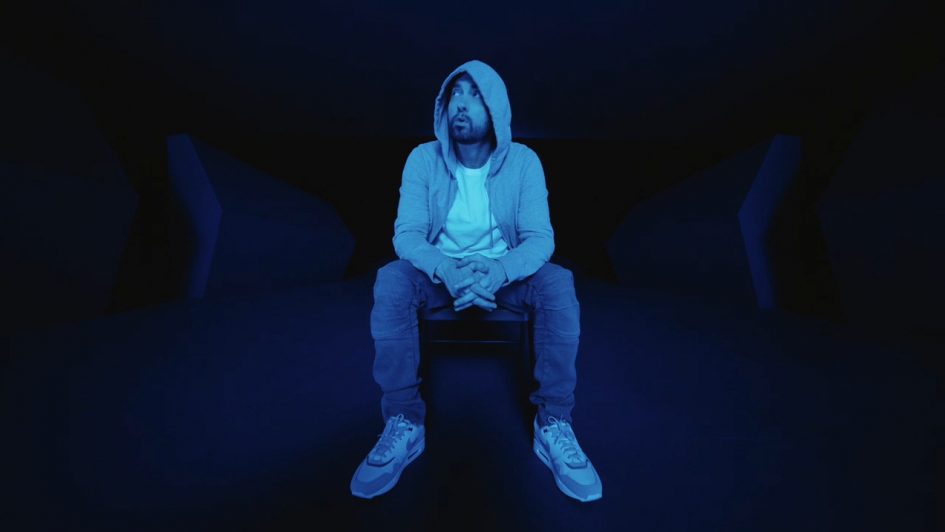On thinking about this project, my mind went instantly to hip-hop for my search for a song. My first and second choice for a track to examine are each from brilliant rappers and singers, and fittingly, the first is a solo work while the second has two main lyricists.
My first choice is “Darkness,” currently a brand-new song by Marshall Mathers, better known as Eminem, off of a surprise album entitled Music to Be Murdered By. This album takes a generally amusing, intense, and even aggressive tone characteristic of Eminem’s work throughout his career. The song itself, along with the video, exhibits Eminem’s brilliant awareness of his own songwriting reputation and media image. At first, it appears to talk about the pressure of being a celebrity. In the video, we see Eminem front-and-center in a room lit by dour blue light, along with a figure in a hotel room which also appears to be Eminem, wearing the same gray hoodie.
As the song climaxes, however, we find that the figure in the hotel room is portraying the Mandalay Bay shooter who victimized Las Vegas in 2017. The lyrics, which first listeners thought were typical of Eminem, were really a representation of a real-life murderer.The chorus of the song is simply a repetition of the phrase, “I don’t wanna be alone in the darkness anymore,” representing both his mental state and his desire to victimize.
The most compelling musical feature of the song is its adaptation of “The Sound of Silence,” originally by Paul Simon and Art Garfunkel, which has ingrained itself in 20th century American culture for its mention of dark visions, creeping loneliness, and a people lost in the fantastical yet hollow splendor of cities and neon lights.
This song is a brilliant twist on the subject matter that Eminem’s fans have come to expect, and makes use of double entendres and sound effects to demonstrate the astoundingly small difference between someone isolated or mentally ill, and someone who finally acts on their dark thoughts.
Barring the use of “Darkness,” I’d like to analyze “SIRENS,” a song from Denzel Curry’s album, TA1300. SIRENS features uncredited vocals by Billie Eilish, along with two verses from Curry and one from rapper J.I.D. Its lyrical subject matter includes everything from abuse, to government, to God.
The chorus represents God calling on humanity not to let him down once its problems come due, and Curry’s lyrics include criticisms of Trump administration rhetoric, a system of law enforcement which represses minorities, and a state which deprives entire peoples of their innocence. J.I.D. compares the United States to an abusive lover that constantly dismisses and condescends the repressed individual, remaining unclear about their intentions or expectations even as the consequences are violence and bodies left lying in the streets.
While not as musically sophisticated, in my opinion, as something like “Darkness,” the lyrical ingenuity of “SIRENS” makes it potentially worth examining. Denzel Curry and J.I.D. push each other more deeply into the song’s themes, one more aggressive and one more resigned in delivery, and the music video reinforces the themes well.

February 1, 2020 at 9:37 pm
Hi Gavin,
When I watched “Darkness” after it was released, I hoped someone in class would pick it as the song to focus on. I think its a great choice. I didn’t know about the Simon and Garfunkel reference, but that adds a very cool additional layer.
Looking forward to you do with it!
Bill